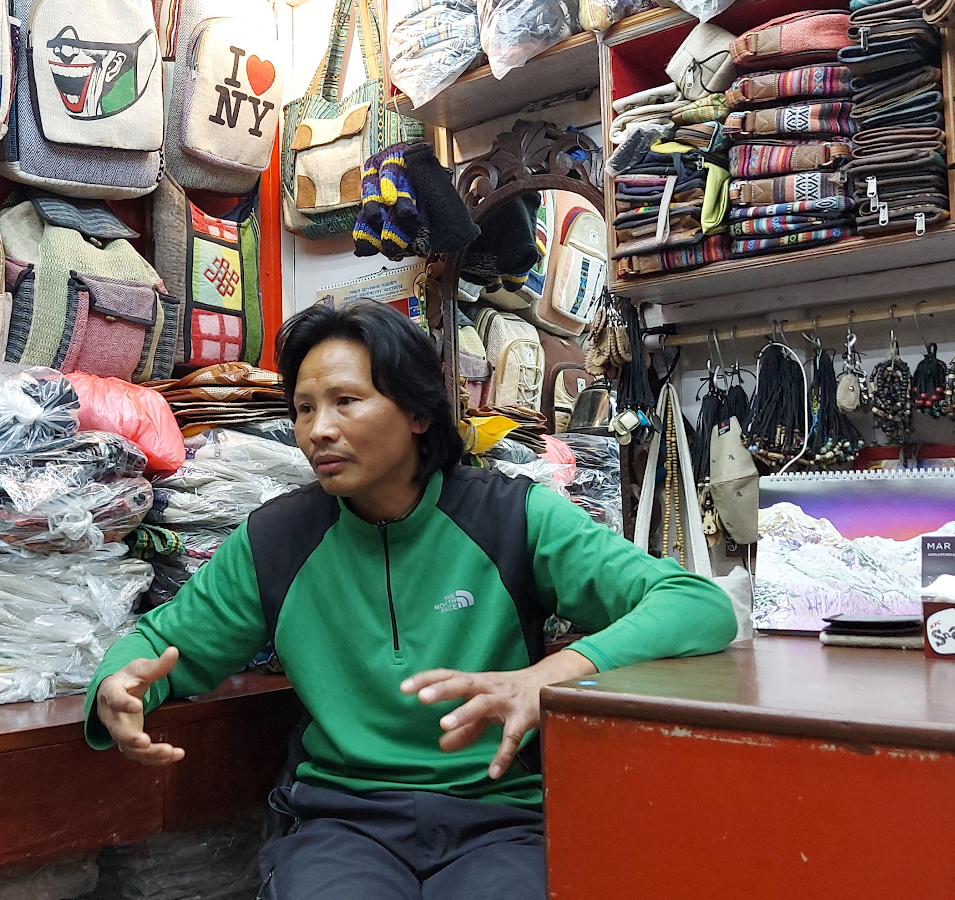
Saila dai’s shop looked just like any other tourist bag shop we see at Thamel with varieties of jute and hemp bags of all sizes ornamented all around. As we entered the store, Saila dai was seated at the counter, he showed us around seemingly self-conscious about the goods, repeatedly adding, “aba arko pali ramro saman lyaunu parcha” (which translates to “we need to bring better goods next time”). He was a lean guy in his early 40s, with veiny arms and sleeves, dragged up to his elbow; he offered us tea: the traditional Nepali culture of treating guests was not forgotten even in such times of crises.
Bhauju, his wife, sat nearby throughout the interview. Before the lockdown, she used to manage another shop, even bigger than this one. After the first lockdown, the bills got difficult to manage and the landlord was constantly troubling them for rent compelling them to shut that shop. They packed the leftovers and brought them to this current store. This shop is owned by someone else, but they agreed to let Saila dai sell his goods too. It had been around 20 years he was working here, the owners were more like his family now.
Saila dai was 12/13 years old when he first came to Kathmandu in 1991. He sold souvenirs to tourists back then. Adding up the years, we collectively figure it has been around 30 years since he has been working in the tourism industry. In those 30 years, he says, the lockdown has been like no other, the troubles of the earthquake did not even count to a percent of what COVID-19 has done to their lives.
During the lockdown, there was a phase where he thought they would die of hunger. There was no income and the savings were dwindling rapidly. Seemingly out of sources of income, they thought of selling vegetables as a desperate attempt to make their ends meet. However, even that did not seem like a good idea. “Back in those lockdown days, sales in the footpath were not allowed, a thela (vegetable cart) was compulsory, but the investment for thela could instead be used to cover the daily necessities for at least a few days”. Struggling with procuring even basic everyday meals, the choice was clear. During those desperate times, he heard of government relief packages and enlisted his name. Receiving food support from the government, although took months to arrive, seemed like appreciable support.
After the lockdown was lifted, he opened the shop but the place was deserted. He asks, “For whom do we even unload the items?”
As he was speaking, a few teenage girls entered the shop and bought a few purses, bargaining from 400 to 200. Bhauju was unsure of giving away the purses at this price but for Saila dai the priority, at this moment, was sustaining the business rather than earning a profit.
Saila dai says he is terrified, he looks uncertain of his future and stutters expressing his anger with whatever has happened after the pandemic. Profit at this point is unimaginable selling one bag a week and at this rate. The revenue is hardly enough to cover electricity and rent- let alone his own cost of living. The owners are thinking of closing the shop if this goes on for too long. Closure of this shop would mean the closure of his sole source of income. Saila dai ponders on what to do next. The answer is as uncertain as the situation brought forth by COVID-19.